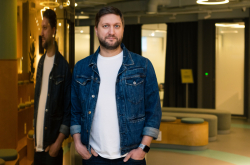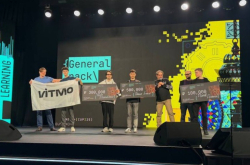The School of Practice and Theory of Concurrent Computing is the result of a collaboration between ITMO University and Télécom ParisTech. The school’s partners are: Devexperts, a developer of software for broker, exchange and financial activity and Yandex, Russia’s largest search engine and provider of online services and products.
The School will last five days from July 3 to 7. In that time its participants – students, postgraduates, young specialists and developers – will attend lectures by leading international scientists and representatives of IT companies. Among the topics of the lectures and workshops are modern blocking methods, machine learning, analysis of shared data structure in weak memory models, and the latest developments in the field of transactional memory.

Daria Kozlova, ITMO's Vice Rector for International Relations, speaks at opening of the Summer School
The terms “computing” and “concurrent (parallel) computing” are nowadays practically synonymous. Be it a multi-core machine, a computation cluster or a geo-distributed service, a computation system is a multitude of processes performing simultaneous computations and sharing data to synchronize their results. Today, an understanding of the basics of concurrent computing is becoming a prerequisite for those who plan a career in any field of computer technology.
Concurrent computations gain a particularly special importance in the area of, for example, finance, which today is in need of effective, viable data structures, as emphasized during the School’s opening meeting by Roman Elizarov, a co-founder of Devexperts, ITMO alum and head of the development team for JetBrains’ programming language Kotlin. Mr. Elizarov is also among the School’s faculty.

Roman Elizarov
“All computation is now performed on multi-core machines; nobody uses sequential computing any longer, especially in fields where efficiency and speed of calculation is a top priority,” – adds Petr Kuznetsov, one of the school’s organizers and a professor at Télécom ParisTech.
As he explains, the idea of organizing a Summer School dedicated to research in concurrent and parallel computing was first formed a year ago. The organizers’ main intention is to provide the participants with a significant amount of basic knowledge on the subject.

Petr Kuznetsov
“Last year I gave a talk at ITMO University after I was invited there by Vladimir Parfenov, dean of the Information Technologies and Programming Faculty. This was also when I first met the university’s experts including Roman Elizarov who is, too, watching this field closely. I learned that ITMO University has been working on concurrent algorithms and development of concurrent data structures, so, naturally, we felt that it would be fitting to organize such a program. The format of a summer school is most fitting for it. We begin with the basics of concurrent computing so that everyone will be speaking the same languages when we continue the discussion. Later, if the school succeeds at its goals, we can dive into more specific areas” – explains Mr. Kuznetsov.
The first day of the School included a lecture by Nir Shavit, a renowned scientist, winner of the Gödel and Dijkstra prizes and professor at Tel Aviv University and the Massachusetts Institute of Technology. The list of speakers for the School also includes professors from EPFL University (Lausanne, Switzerland), Brown University (RI, USA) and other top universities from Europe and the US. Students will not only be able to attend lectures, but to take part in practice-oriented classes. According to Dmitry Tsitelov, senior researcher at Devexperts, the Summer School’s program will be beneficial not only to students, but to accomplished specialists as well.

The First Summer School on Practice and Theory of Concurrent Computing
“I believe that lectures and workshops that are a part of our Summer School will be of greatest interest to students who would want to gain a deeper knowledge of concurrent computing and find out if this is a subject they would want to study further. In addition, our audience also includes a number of specialists who, nevertheless, can’t always find the time to study this subject while working. I think that they, too, will find it useful to learn more about it here,” – says Mr. Tsitelov.
More than 90 participants registered for the first-ever Summer School in concurrent computing. Among them are students, postgraduates and young researchers from the universities of Russia, USA, Switzerland, France, Ireland, Israel, as well as experts from companies such as Yandex, Devexperts and Facebook. On their first day, they spoke to ITMO.NEWS about their research and the growth potential in the field of concurrent computing.

Prof. Nir Shavit
Hannaneh Najdataei, Chalmers University of Technology, Sweden
I am currently completing a degree at Chalmers University and concurrent computing is the topic of my research work. My advisor told me about this summer school and I thought that taking part in this course is a great opportunity for further development. I had already taken part in online courses by the Summer School’s lecturers, so I find it important to continue my education and maintain the partnership that exists between Chalmers University and the professors that have come to St. Petersburg to take part in the Summer School. Still, I don’t rule out the possibility of also forming a similar partnership with Russian specialists.
Evgeniy Ivanov, senior software engineer at Yandex, ITMO University alum.
Concurrent programming is an interesting and relevant topic of study. In addition, the lectures here are read by the world’s leading experts in that field. My current work is related to storage and processing of data, and MapReduce – just the kind of thing that is related to concurrent programs and distributed systems. I think that today it is especially important for developers and young researchers to study data structure; because even though it’s a very active field right now, there are still many open problems left. I hope that, as part of the school, we will have an opportunity to discuss such problems with the leading experts on the subject.

The First Summer School on Practice and Theory of Concurrent Computing
Nikita Koval, research engineer at Devexperts’ DXLab
The Devexperts company has the DXLab laboratory that works in several areas. As of now, my particular area of research is concurrent programming and I am very glad to learn about the latest inventions and innovations in the field and have a chance to talk with world-class experts. For instance, it’ll be very interesting to learn about transactional memory that is already being integrated in CPUs and has been developing significantly in recent years. Generally speaking, when we speak about concurrent programming, it should be noted that all the banks, massive online services, social networks like “VK” or “Odnoklassniki” are, each in their own way, trying their hand at it. Because of this I believe that developers who work at such companies will benefit greatly from the new knowledge they will acquire at the Summer School.





